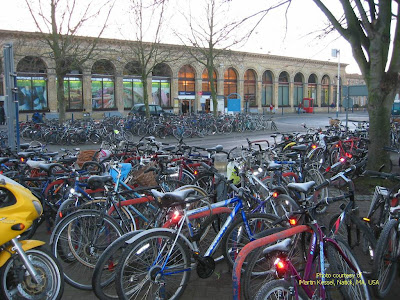Gas prices continue to be the hot topic. Oil has hit $140 a barrel, and many people are projecting $200 a barrel prices by the end of 2008. As long as gasoline is considered a necessity—something we have no choice but to buy—demand will be relatively “inelastic” with respect to price. The drop off in demand will not be proportional to the increase in price because most people see no alternative to automobile transportation. As a result, we are going to be beaten down by any price increases that come along.
If gas is a necessity, we have ourselves to blame. The Interstate Highway act of 1956 made it possible to live far from work, and single use zoning created towns where housing was segregated from business and retail districts. Finally, FHA mortgage programs favored single-family dwellings over multiple-unit housing. The result was the great suburban expansion of the post-World War II era. Finally, for many years the automobile business was the leading industry in the US, and public transportation systems were discouraged. Today, few of us can walk from our homes to work or even the grocery store, and we are almost completely dependent upon internal combustion engines. Unfortunate, half a century later, both the cars and the fuel are likely to come from abroad, and we have no choice but to buy them.
In the long run, we will be much better off if we go back to a more European style of village- or town-focused life that makes better use of public transportation, as well as foot and bicycle travel. As higher gas prices hit in 2008, demand for gasoline dropped off the more in the UK than in other areas of Europe and the US. Why? Because the British have more alternative forms of transportation. An oil industry analyst quoted in a recent Daily Telegraph article put it this way:
They are switching to public transport, which is much easier to do in Britain than in America, where people living in the suburbs often have to drive whether or not they want to.
Consider also the use of bicycles in the UK. The photograph below is of the train station in Cambridge, England, where commuters deposit their bikes on their way to work in London or elsewhere.

Cambridge is a town of approximately 130,000 people 50 miles northeast of London, and it is thought to have the highest level of bicycle use in the country. According to the 2001 census, 25% of citizens said they used bicycles to get to work each day. With gas prices on the rise, one can only assume that figure has gone up. For Cambridge residence, gas-powered transportation is not a daily necessity.
When Americans have greater choice about whether or not to get into their cars, they will far less vulnerable to fluctuations in the price of a commodity we must by from foreign suppliers. But if we are to create more transportation choices, we will need to make substantial investments in infrastructure, reversing some of the transportation and housing trends of the last 50 years. The good news is that, with a sagging economy, this an excellent time to make those investments.

No comments:
Post a Comment